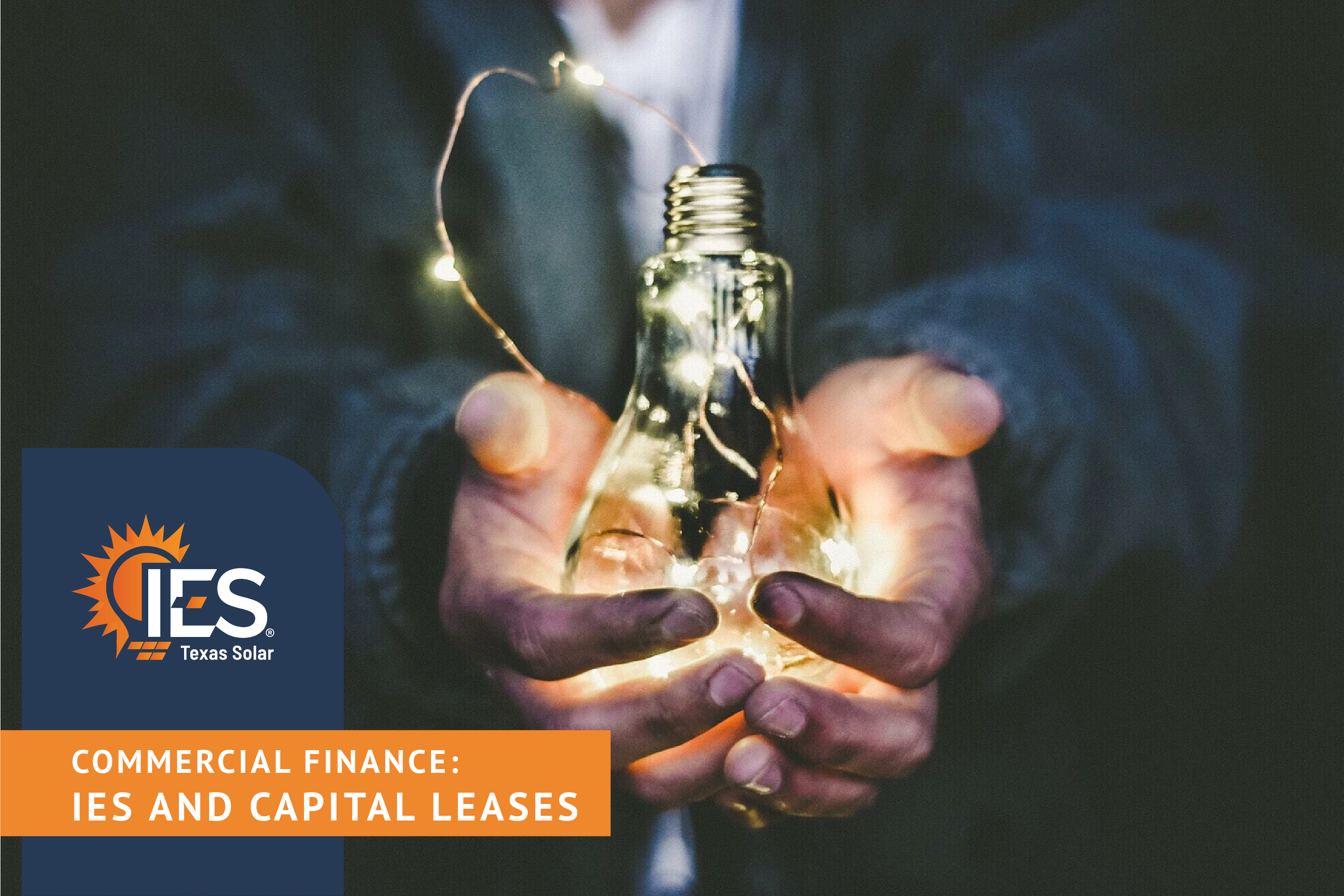
Time to read: 5 minutes
Welcome back to our series on financing solar powered systems!
In this post, IES energy solutions manager Justin Charles gives us a look at another financing option that potential solar owners can choose for their home or business: Capital Leases.
New to this series? If you are, then we recommend starting with our first installment on Cash Purchases to get an in depth look at tax incentives and depreciation incentives.
Justin has 12 years of experience in the alternative energy space, specifically the solar industry, and runs the solar division of IES where he focuses on building commercial opportunities, particularly in regard to creative design, engineering, and helping customers with finance solutions that allow them to afford the projects they want.
To briefly recap, IES Texas Solar looks at solar as their primary opportunity and also offers generator solutions, battery backup, and LED lighting. IES Texas Solar looks for ways to reduce energy consumption by offsetting it with the production of solar energy.
A common misconception that Justin Charles puts to rest in this series is that Solar Power is thought of as being too expensive. In reality, there are many different financing options available to any business looking to purchase a solar powered system and take advantage of tax credits while they do so. For a more detailed description of tax credits, please refer back to the previous entries in this series.
Now that we’ve covered Cash Purchases and Bank Loans in the last two articles, it’s time to talk about the next option on our list: Capital Leases.
What is a Capital Lease?
“The first two scenarios we discussed were cash and bank loans. Probably the most common option after a bank loan is a capital lease. Capital leases have a higher interest rate but require no money out-of-pocket. You don’t have to have a deposit or a down payment. There might be some small application fees, if anything, but it doesn’t show up as debt on the company’s books. There is no reduction to the borrowing potential of a business when you have a capital lease.”
“A capital lease isn’t what’s considered a true lease by the IRS. What’s leveraged here are the assets, not of the building but the solar assets that are going to be installed. Technically, the leasor owns the PV system and the leasee is paying for it over time. This is typically for a seven-year period. At the end of that seven-year period, you’re going to pay $1 for that system.”
“You have a trivial predetermined buyout. It’s $1, but the leasee still takes advantage of the tax credit. They’re responsible for insurance and the maintenance of the system. They get all the tangible benefits of that system, including any tax credit, depreciation of the system, et cetera.”
“Really, this is a form of a bank loan that doesn’t show up as debt on your books. You might still have to sign a personal guarantee as an owner, depending on how you structure your company. A lot of businesses try to take as much money out of the business every year as possible, especially limited liability corporations, S-corps. The goal is to pull as many assets out of the business as they can every year so that their personal assets grow while the business assets stay small.”
“In those kinds of situations, it’s really hard to lend against business assets. Owners sometimes still have to sign a personal guarantee in these situations. But a personal guarantee and a lease are not filed items that show up on a credit report, so if you go to borrow $5 million to build a new building or buy more inventory or get a line of credit, those items don’t show up.”
“Even if you could have gone to your bank, even if you could have received a loan, while it’s a higher interest rate, it doesn’t affect your borrowing potential. A lot of people might choose this option because it allows you to get a solar powered system, even with a reduced savings amount and without limiting your ability to do something else that you may want to do with your business in the future that you couldn’t use this mechanism to buy.”
Tax Benefits
With this particular financing method, you do still get the tax benefits of the system. This is not what’s considered a true lease by the IRS. It’s a capital lease. The next choice that people consume or choose is what we call an operating lease, which we’ll get into in the next article.
Solar is a phenomenal and stable financial investment for almost any and all types of businesses and the best way to figure out if it’s right for your business is to talk to a consultant. Start by getting them at least one, but preferably 12 months, of your energy bills to see what kind of opportunity there is for you in savings. We can then look to see if there is a perfect financial vehicle for you. If purchasing it outright with cash isn’t the right option, there are several ways to do it with no money out-of-pocket. Don’t make cost a barrier to entry for you. Doing a lease can start for system purchases as low as $50,000.
If you are considering switching to solar for your home or business, reach out to us by going to our website, iestxsolar.com, or by giving us a call at (855) 447-6527.